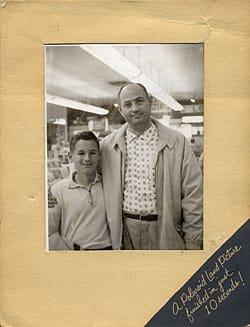20 Jun A Final Gift For My Father
I wasn’t impressed with Ronald Reagan’s death. I didn’t remember holding him or his values in high esteem when he was first governor and then President. Yet, why was everyone talking so sweetly about the man’s legacy? Young bloggers with beautiful design skills spoke highly of him –too young to remember Iran-Contra and Central American death squads. Old media salts who had jousted with him during his tenure waxed poetic remembrances of his accomplishments.
Imperceptibly, I started walking hand-in-hand with them. Right to the edge. Just as I was about to admonish myself for forgetting how much I truly loved him, I staggered to a stop. My toes wiggled freely over that precipice. It was so inviting. The warm fatherly adoration encased me. It was a very old feeling. Beyond politics.
Wait, that wasn’t it at all. We were suffering from historical Alzheimer’s.
I waved off the chance to see President Reagan’s coffin. But last Friday night I was mesmerized by his return to California. That’s when I really started to remember.
Those were the rolling hills where I spent my early years. Watching Nancy Reagan and her children I couldn’t help but compare them to my own family. I always had. Despite their loving eulogies I remembered remote fathers and cold mothers. Their dysfunctional relationships had been broadcast loud and clear back then.
Nancy had always reminded me of my father’s second wife, both in looks and demeanor. Nancy and Vera. Ron and my father. I forgot Reagan’s policies and closely recalled our families’ lives.
At my father’s funeral his friends told warm anecdotes about his generosity and humor. I walked away from the graveside service wondering just whose funeral I had witnessed. My sister and I were treated so differently. Yet, I could tell there was more than one truth.
For the first time I saw Dad through his friends’ eyes. And I saw myself in those stories. Death has a way of giving voice to strongly guarded mysteries. When my father died that tension relaxed. And his energy released, energy he worked so hard to control all his life.

A Polaroid Moment: Dad and Me
in the Early 1960s
Thirty years ago, soon after my mother’s death, I told my father “someday you will die and we will never have talked.” He was silent then. But we were talking now. Death is a complicated process for the living.
I have seen Vera once since Dad died. Last year I took my family back to L.A. to meet my relatives. I wanted them to know where I came from. Vera and I were never close. We don’t correspond.
In my father’s final days I asked him if there was anything I could do for her after he died. I had tried to think of everything I wanted to say to him and, as difficult as it was for me, I added this to my list. “Love her,” was his strong and clear reply. “Love her.”
If ever there was a person who made it clear she didn’t want anything from me, let alone my love, it was Vera. But I told Dad I would do my best, not knowing how I could ever hope to fulfill his dying request.
When I told a good friend my dilemma she replied, “But Jeff, you already have loved her. When you told her you would be there for her, despite your differences, you did so without any thoughts of getting something in return.” So I had. I was relieved and surprised. How did I learn to act so maturely, to face the difficult issues head on? This was a new kind of love: a very difficult kind.
After Dad died she used to send my girls birthday cards and some money every year. But, suddenly, they stopped coming. My children never made the connection with who she was so her gifts remained abstract to them –something from a stranger. My oldest bought an ant farm one year. They had no expectations. Not like I had had.
Yesterday, I got a letter from my father’s sister. Did I know that Vera had sold the house and moved to a retirement community? She could no longer stand living there without him. The impact of this news surprised me. It was a shocking reminder of how distant I was from my father’s life now (and of how I had struggled with that distance while he was alive).
Dad had moved into Vera’s house when they married in 1972. I was an adult by then. It wasn’t the house I grew up in. Well, now that I think about it, maybe it was. Perhaps that’s why I was feeling its loss so strongly.
Vera loved that house. My father really is dead. Inseparable in life, my stepmother had to move on.
I can see how time shapes our memories. Future historians will determine the truth of Ronald Reagan’s legacy beyond our funerary remembrances, just as I am slowly unearthing my own. I probably will never speak to Vera again. But I did love her. And that is my gift to my father.




Sorry, the comment form is closed at this time.